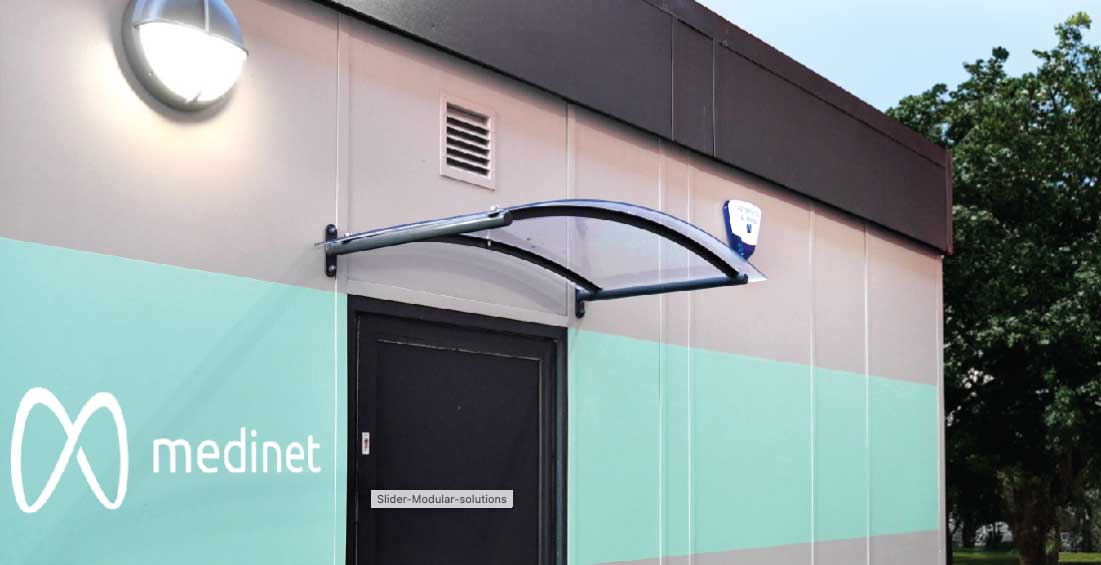
Blog
CSJ May Edition Article
Modular units are one of the most effective ways to upgrade NHS capacity and crack down on the huge waiting list facing millions of patients in the UK. You don’t need us to tell you about the pressures faced by the health service, so instead we want to highlight some of the solutions available, and how NHS support services like Medinet can help.
It’s not as simple as building new hospitals; putting the infrastructure in place to expand capacity can, in the interim, result in even worse backups. A solution is needed that can operate alongside existing departments, instead of exacerbating existing pressures. At the point of GPs through to diagnostics, to theatres and wards, capacity needs to be increased in a way that is cost-effective and more importantly, safe. While the government committed to building 40 new hospitals in England by 2030, delays to projects makes meeting that target increasingly unlikely, and even if it is achievable, a time-critical solution is needed in the interim.
What exactly are modular units?
Designed to fit seamlessly with existing hospital facilities, modular units are flexible, low carbon, temporary options that some of the current problems Trusts face to meet demand. There are plenty of benefits, and there are multiple frameworks in place to fund the addition of modular units onto hospitals all over the UK. A rebooted framework for 2025 is expanding to £3.6billion.

A solution with a proven track record
Modular units have been around for decades; in the UK, modular units were a timely response to the housing crisis post World War II, thanks to their cost efficiency and ease of building. The UK has embraced modular construction, with units now a crucial part of NHS infrastructure. They serve as a long-lasting and cost-effective way of expanding hospital capacity, reinforcing the system’s ability to meet healthcare needs. At Blackpool teaching hospitals NHS Foundation trust for example, we’ve developed an innovative endoscopy healthcare unit to alleviate waiting list pressures on the trust which has seen great success.
“Our track record in supporting the NHS, delivering high volume services across multiple clinical specialties, allied to our ability to design, build, and mobilise modular facilities in short timeframes, puts us in a unique position in the current healthcare landscape. The ability to work alongside our NHS partners as an extension to their services, but in our own managed facilities, has shown exceptional levels of productivity and demonstrated the significant positive impact that we can have on waiting lists.”
– Oliver Bailey, Chief Growth Officer (Medinet)
Modern technology to support the NHS
The increased use of modular units coincides with an uptick in new technologies in healthcare, from AI to advanced imaging techniques. GI Genius™, for example, is the first-to-market, deep learning, computer-aided polyp detection system able to detect polyps of different shapes, sizes, and morphologies in real-time (Medtronic, Medinet). Powered by software trained with over 13 million images, GI Genius™ helps address the challenges of detecting potential signs of colorectal cancer early. It harnesses deep learning algorithms to assist in clinical decision-making during colonoscopy in real-time, using visual markers to both alert physicians to the presence of lesions and to provide a potential prediction of the histopathology using its characterisation feature. Features like this, alongside dedicated units for endoscopy, pose an exciting future for the NHS.
The future of modular units within the NHS
Despite the immense pressures faced by our health service, there are reasons to look positively into the future. The NHS is adapting with new technologies including AI diagnostics, telemedicine, and virtual wards, and modular units. Modular units offer a practical solution to the capacity challenges currently faced by diagnostic centres, theatres, and post-operative facilities in trusts all over the UK.
Boosting in funding is cause for optimism going forward, and multiple frameworks are available to NHS trusts to source modular units. These frameworks include the NHS Increasing capacity framework established in 2021, the NHS England Community Diagnostic Centres Framework, and the Modular Buildings Framework Agreement which has been running since July 2021, with a boost to the framework poised for 2025. These frameworks offer trusts across the UK routes to develop modular units, and promise significant savings, faster delivery compared to on-site construction, and less disruption, contributing to strategies on modern construction and net zero goals.
Read the full article at:
References:



